26 Dec 2023, Samaria: The Israel Defense Force (IDF) has ramped up attacks against Hezbollah in Lebanon, seemingly pushing them further away from the border. Hard to tell what’s really happening there.
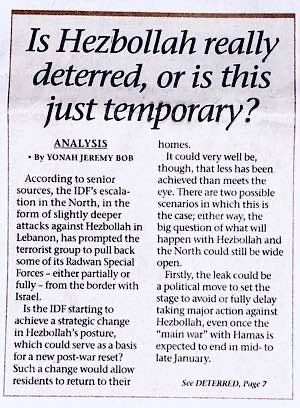
More prayer is needed for these situations.
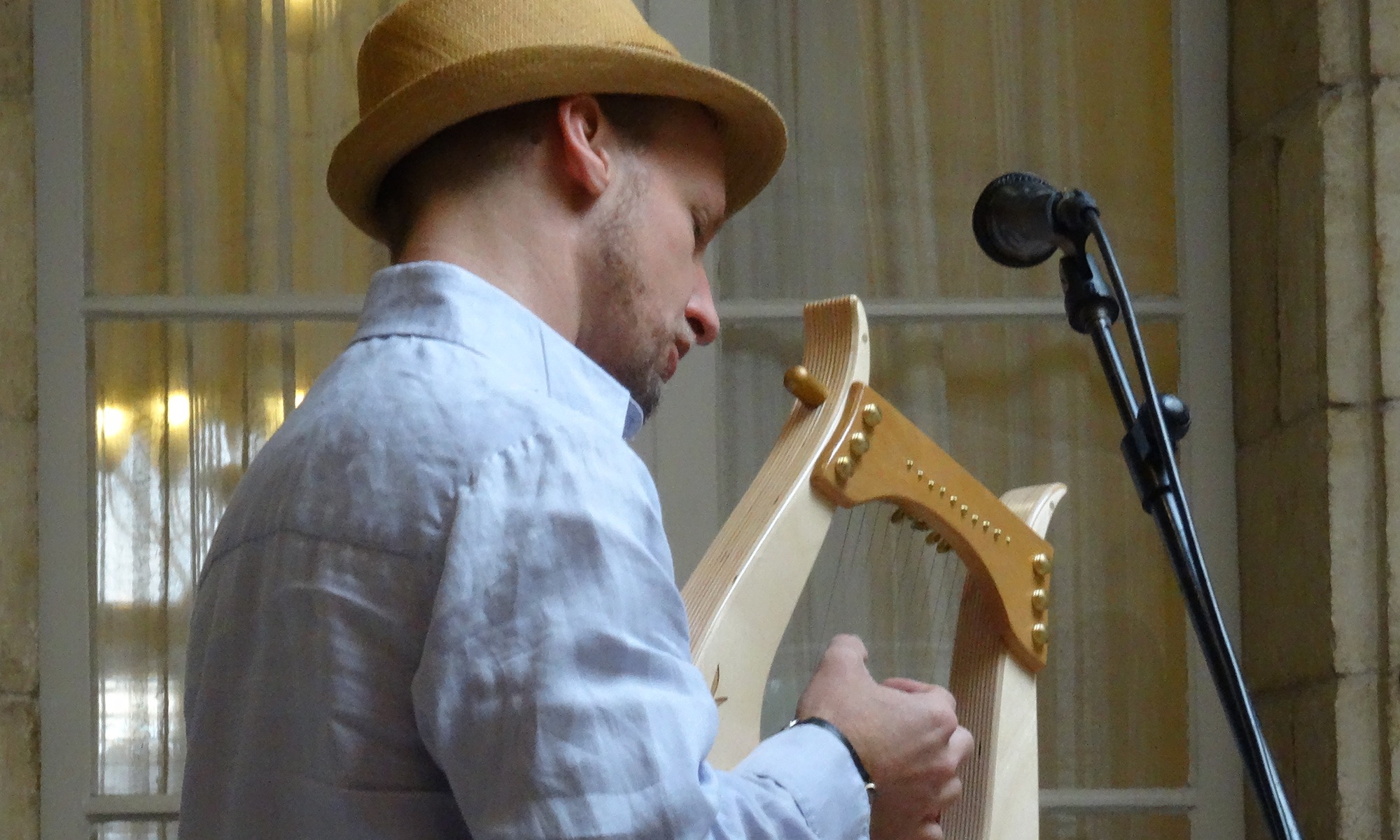
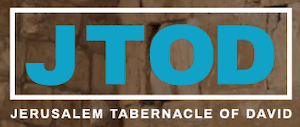
JTOD – Jerusalem Tabernacle Of David
Join Elohim’s Plan for Amos 9:11
26 Dec 2023, Samaria: The Israel Defense Force (IDF) has ramped up attacks against Hezbollah in Lebanon, seemingly pushing them further away from the border. Hard to tell what’s really happening there.

More prayer is needed for these situations.
26 Dec 2023, Samaria: Residents have said they heard explosions and sounds of digging under their homes, but the Regional Council says–with little investigation–that it has found no evidence.
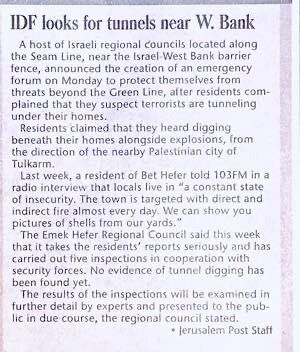
Proper investigation will be required.
Yet, I think this is true. Why? Because I trust the people who heard the noises under their homes more than the local council officials who probably showed up for 5 minutes out of their busy day and said, “I don’t hear any noises!”
The truth won’t be known until there’s a proper investigation. Until then, I personally believe the homeowners.
26 Dec 2023, Samaria: In the 2014 Israel Hamas war of 50 days, the ratio of Gazans killed turned out to be about 50/50. 50% were militants, 50% were noncombatants in Gaza. This time it’s shaping up to be an estimated 40/60 ratio. The war is currently over 80 days and may last at least 100 days overall.
“Senior IDF lawyer: ‘No one has ever fought a war like this before;’ Military’s conduct is qualitatively different, keeping within international law”
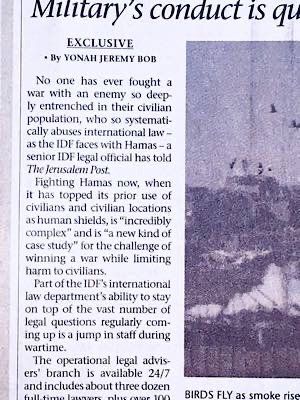
Jerusalem Post, 26 Dec 2023 pg 4.
26 Dec 2023, Samaria: While Israel has not taken responsibility for the airstrike that killed Iranian Sayyed Reza Mousavi near Damascus, Syria, still, Iran threatened Israel of payback, as is customary:
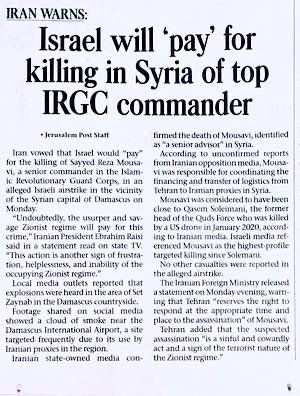
Mousavi was a senior military commander in Iran’s “Islamic Revolutionary Guard Corps” (IRGC).
Wonder what he was doing in Syria, anyway?
Jerusalem Post, 26 Dec 2023 pg 2.
25 Dec 2023, Samaria: In the 1980’s, Bethlehem’s population was still over 90% Arab Christians under Israeli government rule, and all races and religions were allowed in Bethlehem since Israel is a law-abiding open nation with freedom of religion. Since the Oslo Agreement in 1994 which resulted in the creation of the Palestinian Authority, Israeli government handed Bethlehem over to the PA which had just been resurrected from the remains of the Palestinian Liberation Organization which had been exiled in Tunis–a safe distance from Jews.
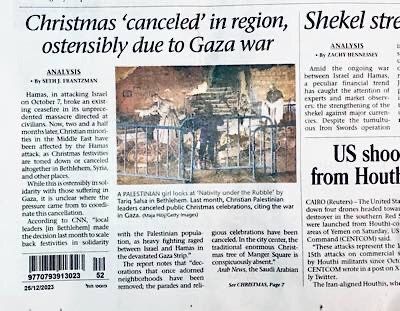
After that handover, Jews were not permitted entrance; Muslims from the Israeli city of Haifa flocked to Bethlehem in a hostile takeover of Christian Arab homes and businesses – an ethnic cleansing. Arab Christians fled to other parts of the world. Today, Bethlehem’s population is less than 20% Christian and over 80% Muslim, and Jews are still not allowed.
Against this backdrop of recent history, we see that today, in “solidarity with Gaza,” Bethlehem has cancelled Christmas, along with Syria and other places in the region.
24 Dec 2023, Samaria: Noa Argamani was seen in a viral terrorist video while being abducted on a motorcycle from the Nova peace party; After examining the kidnappers’ clothing in the video, and how their clothing differed from that of the elite Hamas attack unit’s military gear, a new report has determined that a civilian mob kidnapped her. Also, the sunlight and shadows in the video prove that the time of kidnapping was later in the morning, not at 6:18 am, which was the time of the initial surprise attack.
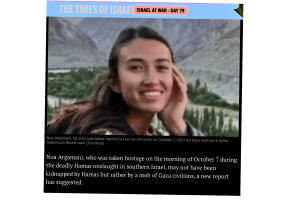
—-
Source: https://www.timesofisrael.com/noa-argamani-was-abducted-not-by-hamas-but-by-civilian-mob-nbc-report-suggests/
22 Dec 2023, Samaria: Israel observes the laws of “just war” established by the Christian Saint Augustine and by the Geneva Convention.
And yet, that’s not good enough for Catholicism.
In a Page 2 article in Jerusalem Post, the Chief Rabbi of South Africa cited a Wall Street Journal opinion piece which accused Pope Francis of “primitive pacifism:”
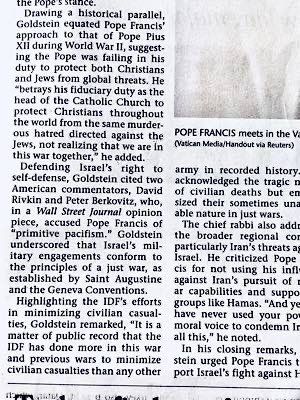
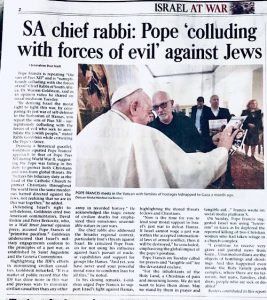
Just as Pope Pius XII made a “deal with the devil,” an agreement with Hitler to kill as many Jews as possible, today’s Francis doubles down on the organization’s Replacement Theology to once again take a stand against Jews.
22 Dec 2023, Samaria: Egypt maintains its Border Wall against Gaza at all costs. Israel and the USA asked for a temporary spot in the Sinai for civilians from Gaza to shelter away from the battle zone. What’s a better humanitarian solution than that? Put the refugees on floating rafts in the Mediterranean? Put them in Israel? The Sinai peninsula is still far from any Egyptian assets. There would be no danger to Egyptian infrastructure nor citizens. But no. Egypt cares nothing about their Arab brothers, the human lives in Gaza.
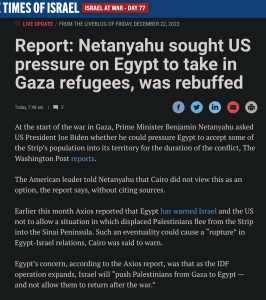
Apparently, Israel asked the USA to exert pressure on Egypt, a US ally. Either the Biden Administration was unwilling, or ineffective in exerting any pressure.
Who pays the price for this failure? Israel pays. The more that Gazan civilians suffer, the more the world can blame Israel for something. Israel gets an outsized amount of blame for civilian casualties in Gaza, despite Hamas, Egypt, Qatar, Jordan, and the USA who all refuse to lift a finger to provide shelter to the Gazans. Pray that the world exerts fair pressure on other parties.
Related:
Day 495: A National Loss of Mental Health
19 Dec 2023, Samaria: US Defense Secretary Lloyd Austin came to Israel to meet with Israel Defense Minister Yoav Gallant. The two are pictured below in thei joint press conference on Dec 18 in Tel Aviv.

Gallant: Hard to avoid civilian casualties in an ‘incredibly complex battle space’ and that civilian casualties are hard to avoid.
Each day one hostage is featured on the cover of the Jerusalem post, on the top left corner. Today, day 74 of the war, we see Eden Yerushalmi, age 24. Eden’s surname, Yerushalmi, means “Jerusalemite;” her family has been known for innumerable generations as being from Jerusalem. Obviously her first name is the Garden of Eden (pronounced “AY-den”.
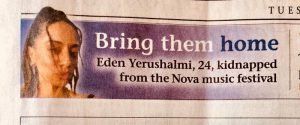
13 Dec 2023, Samaria: Israel’s envoy to the UN: “Call Hamas for a ceasefire. Here’s Yehya Sinwar’s phone number.”
This is the message Gilad Erdan delivered to the UN on behalf of Israel:
“If you want a cease fire, call him and tell him to release the hostages and surrender. No doubt, that is the quickest path to a cease fire!”

This is not a joke, even though it seems funny at first glance. The message is real. The nations want to make it seem as if the entire burden is on Israel. But Hamas bears the burden. Hamas declared war in the first place, Hamas took hostages, raped and murdered civilians in their beds, and continues the fight against a foe they can never beat.
If Hamas has its way, it will strike in surprise attacks again and again year after year, and then run back into its tunnels and plead for a cease fire. “Live to fight another day.” If Israel has her way, Hamas will not be permitted to live to fight another day, and Gazans may, free from Hamas, choose a peaceful party to govern them. Otherwise, someone else will select a party to govern the Gazans. If Hamas survives, they will no doubt govern, and the war will last far too long. If Gazans want peace, the first thing to do is to surrender and return the hostages. Israel will treat the surrender properly according to international law.
Sinwar’s phone number: +970-599-373765.